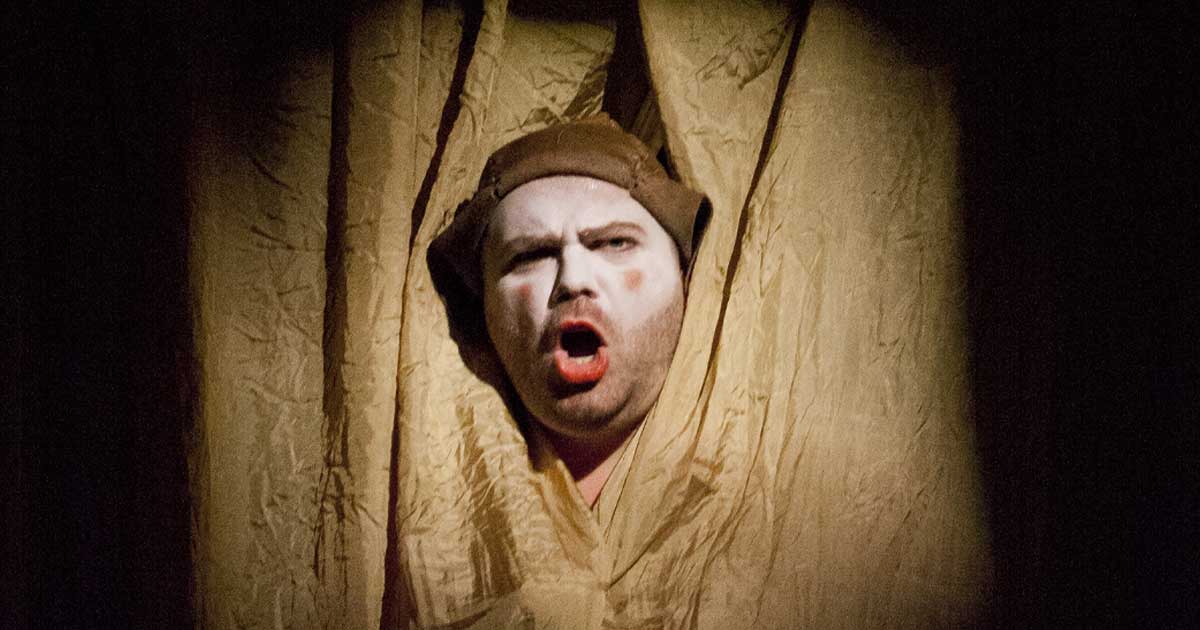
Entertainment Central Pittsburgh – LSD is illegal and you don’t need to risk it. Just go see The Winter’s Tale. This Quantum Theatre presentation is hallucinogenic, hilarious, and, pardon the cliché, awesome.
Since the 1960s there have been many works of the performing arts that strive to be trippy. By comparison, The Winter’s Tale makes most of them seem about as transcendental as a trip to Sheetz for a pair of hot dogs. This thing is high art in every sense of the term. It contains no prefab sausage or bland white bread.
Better yet, though it’s made from highbrow ingredients—we are talking about a Shakespeare play, set to classical Baroque music and sung as an opera, with modern dance and sophisticated special effects mixed in—one does not have to be a connoisseur of any of those genres to get a kick out of the strange combination of them. The chemistry creates a different animal entirely. And you know you are not in Kansas from the moment the lights go up.
The Naked and The Undead
The Winter’s Tale opens with stunning visual effects. Four dancers (enlisted from Pittsburgh’s Attack Theatre) are cavorting on a nearly naked stage to an overture played by members of the Chatham Baroque ensemble. The dancers themselves appear to be naked and tattooed all over … until you look closely and see they’re wearing transparent body stockings stitched with floral patterns.
Projected behind them, on the curtain that spans the entire backstage, is a much larger floral pattern. It has the look of an ingenious CGI photo collage. In the centers of the big blossoms are the faces of various characters from the play. The images are amazingly lifelike and entrancing. Especially when, ever so slightly, the faces begin to move.
Maybe other people in the audience spotted it sooner, but only at that point did I realize I was not looking at photos of faces or even videos of faces. They were the live heads of actors poking through slits in the curtain.
If you were writing a term paper on the production, you might say that this coming-to-life effect symbolizes the power of theater to bring illusory worlds to life, breaking through the wall of artifice and eventually inducing suspension of disbelief. But my school days are over, which excuses me from having to write meta-baloney about stuff that’s really cool. So I will simply say the device got me hooked and the rest of the show reeled me in.
I had come to The Winter’s Tale as a tough customer. Opera is a form of theater which I have attended little and appreciated less. It always struck me the way Olympic gymnastics did: impressive, but not my game. Another concern was that this opera is based on a lesser known work of Shakespeare, one of the bunch that are seldom performed nowadays. There’s usually a reason for that. I had agreed to review the show on a what-the-heck basis, bringing along an opera-savvy friend who could help me fathom the experience as needed.
How surprised I was to find my concerns vanishing in waves of psychedelic delight. If that’s recommendation enough for you, stop now and get tickets. For more details read on.
From Delusion and Dirty Deeds to Flying Toasters
The original Winter’s Tale, written by William Shakespeare in 1610 or ’11, was a very odd play in its own right. Though it’s been greatly cut back and massively embellished in the joint Quantum/Chatham Baroque/Attack Theatre production, the show stays true to Shakespeare’s plot and uses some of his best language. Let us briefly recap major events.
Leontes, king of Sicily, wrongly suspects that his wife has been sleeping with his old friend the king of Bohemia, and that his royal Sicilian children are actually Bohemian bastards. Caught up in self-spun delusion, Leontes orders dire deeds that lead to the death of wife and son while his newborn daughter is carried off to the Bohemian countryside and abandoned to fate.
This is prime material for stormy operatic arias, which the Quantum players provide. Yet weird comic undertones emerge, filtering through to paint mustaches on the face of tragedy. Then suddenly the story fast-forwards 16 years while shifting into comic overdrive.
The baby girl has been found by a shepherdess and raised as the woman’s beautiful but daffy young ward. The prince of Bohemia, that king’s son, falls madly in love with her, to the outrage of papa who doesn’t want his boy chasing a sylvan slum goddess. A raffish rogue rumbles onto the scene, sowing further discord … and you’ve got to see it all to believe it…




